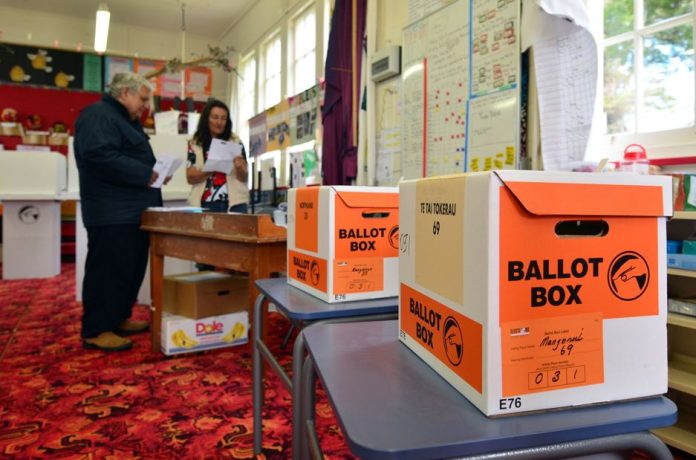By Carla Teng
If a general election was held tomorrow, which party would you support? For many Chinese New Zealanders, the answer would be the National Party, with Christopher Luxon as their top choice for the role of Prime Minister. This information was revealed in a recent study by Trace, a private research firm.
A month before the national election, a survey targeting Chinese New Zealanders was conducted. Out of 1,089 individual who responded, 1,025 were eligible to vote.
Majority of the respondents were from Auckland, followed by the Canterbury and Wellington regions.
Last month, the data indicated a record high of 75.1% support for the National Party amongst ethnic Chinese voters, putting them firmly in the lead.
This spike, based on the survey, demonstrates the party’s effective engagement strategies with this group.
In contrast, the Labour Party faced an all-time low support of 8.2% from this demographic, showing a significant dip in popularity.
Interestingly, the ACT Party has made its mark in the ethnic Chinese voter segment, securing 14% support, showcasing an important shift in this group’s political preference.

Chinese New Zealanders opinion poll for the 2023 General Election. Photo: Trace
In an interview with the Asia Media Centre, Dr Andrew Zhu, director of Trace, conveyed that the economic-focused approach of the National and ACT parties aligns with the priorities and sentiments of Chinese New Zealander voters.
“ACT and National, together, are pretty conservative but economic driven – best reflecting the current situation of Chinese migrants because the cost of living is their biggest struggle, and what they want is economic recovery and tax relief, and those policies been matching with what the Chinese New Zealanders want,” Zhu said.
He added, “Lots of Chinese migrants came here looking for a demographic life, economic freedom of practicing business, and the National seems like the one that aligns with their values better and they have been consistently engaging with local Chinese communities other than any other political parties. While you can see ACT has been successful in reengaging with the Chinese as well. Back in the 1990s, the first Chinese MP was actually from ACT.”
The survey also shown that the rising cost of living in Aotearoa is the primary motivator for Chinese New Zealanders to exercise their right to vote.
Aside from inflation, their top five concerns include crime prevention and law enforcement, job creation, taxation and equity, and access to high-quality public healthcare.
Dr Zhu reinforced that these concerns changed in comparison to the 2020 election, “In the last poll, comparing it to the previous one, the racial discrimination and racial equality was used to be one of the key concerns during COVID, but now it has dropped out of the top five – taxation policy replaced its position. So, whichever party can help them to rebuild economy, rebuild confidence – that’s the party they want to vote for.”
Choice for PM post
Many Chinese New Zealanders back Christopher Luxon for the role of the next prime minister, yet a significant 43.3% are skeptical about a coalition with Winston Peters of New Zealand First.
However, a deeper look into the survey reveals a split within the ethnic Chinese communities regarding Peters. Specifically, 24.1% think Luxon should collaborate with Peters, while 32.6% remain uncertain.
Winston Peters, the leader of NZ First, is well-known for his past statements against immigrants. However, his recent comments about the Chinese community might explain their reconsideration. In a recent public gathering in Nelson, Peters stated that Māori people are “not indigenous” and suggested that their DNA traces back to China 5000 years ago.
Dr Zhu emphasised that the polled Chinese community encompasses more than just those from mainland China, therefore, “When Winston Peters previously asserted that Māori people originated from Taiwan, this resonated with the Taiwanese, leading to claims of Māori having Chinese ancestry.”
Furthermore, he added that interactions at debates or public events hosted by Peters reveal a changing perspective. Dr Zhu notes, “Those I’ve spoken to who’ve attended these events showcase a shift in their attitude towards him. Peters possesses a charm that captures the audience’s attention.”
Dr Andrew Zhu, founder and director of Trace. Photo: AMC
On other issues related to election, the survey also indicated that while the ethnic Chinese community supports term extension from three to four years, they oppose reducing the voting age from 18 to 16.
Significance of ethnic Chinese votes
According to the 2018 census, ethnic Chinese constitute five percent of New Zealand’s population, making them the predominant migrant group. They are followed by Indians and then Filipinos in terms of population size.
Trace, which has been polling for three consecutive elections, aims to capture and quantify the opinions of Chinese New Zealanders. Their findings suggest that this group actively participates in voting.
However, a significant 69% of ethnic Chinese New Zealanders feel that their community’s representation in the country’s politics is not adequately valued or recognised.
Nonetheless, the ethnic Chinese in New Zealand remain optimistic about the power of their vote. They hope that the forthcoming election might herald a transformative period, not just for their community but also for the broader Asian demographic in Aotearoa.
Check full Trace research here.
-Asia Media Centre




